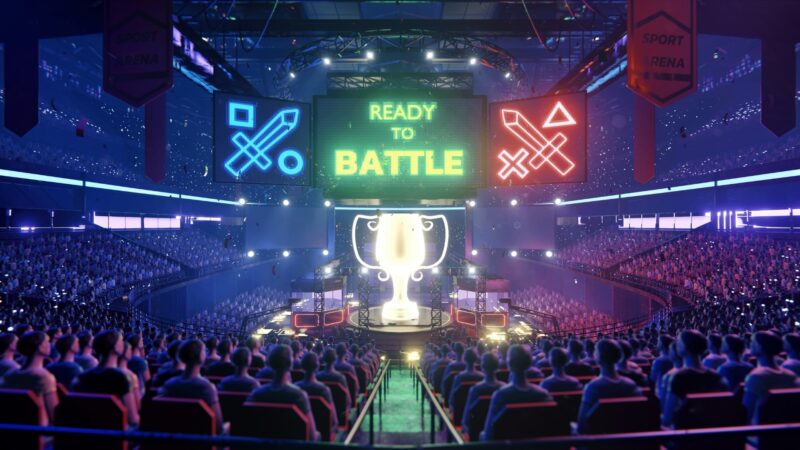Cash tournaments are coming to mobile gaming. The competitive gaming industry-at-large (aka Esports) is a multi-billion dollar business prolific mainly in PC gaming, and soon, it won’t just be a niche segment in mobile gaming, but an expected requirement among mobile gamers. More and more mobile game publishers are exploring cash tournament feature mechanisms and operations for their catalog of games. We expect the rise in availability of mobile cash tournament games in 2022 will also lead to an overall increase in player interest for competitive gaming, and even more pressure for mobile game publishers to enter the market next year.
As publishers explore mobile cash tournaments, they’ll have to decide whether to invest in a robust platform with player matching and leaderboards, payments, fraud protection, etc. as well as navigate the regional regulatory requirements to enable cash tournaments in their mobile titles.
Traditionally, in the game industry where creation and developer-heavy teams are the norm, the preferred approach is to build custom applications in-house over concerns that third-party solutions won’t meet their specialized needs (think: teams that build their own custom game engine or development tools). But, in the highly regulated industry of competitive cash tournament gaming, the complexity of payouts and other elements is not familiar territory to the typical mobile game publisher. Before making any expensive, risky decisions on this front, here’s a guide on what you need to know about launching and operating a cash tournament platform for mobile gaming.
It’s All Fun and Games…..and Payouts and Fraud Prevention
What do mobile cash tournaments consist of? You could say there are an increasing number of features that are becoming the gold standard in driving user engagement and play in cash tournaments, but the core elements needed most by publishers include:
- Matchmaking system: the basis for connecting players together for competition. You’ll need playlists for continuous play sessions that players can join at will, parties that join players as a group, lobbies where players can view the next set of competitive games, a ranking system to match players with roughly equal ability and dedicated servers to support the system.
- Leaderboards: an effective way to drive competition by displaying player rankings. Your dedicated competition servers will keep the leaderboards fresh with active data.
- Chat and forums: a way to keep players connected and build a community. Tournaments are only as fun as there are people to play against competitively. Keeping an active community requires integration and maintenance of some social features.
- Payout capabilities: the ability to pay cash to tournament winners through wire/online bank transfer. While there are numerous third-party solutions for online payments, you’ll still need to define the process of payouts to players because you’ll need to take into account the time it takes for the next point below – fraud detection and verification before making cash payouts.
- Fraud detection: an internal fraud audit and identification process, often paired with software to prevent or identify fraud when it has occurred. Fraud detection is critical in a cash tournament environment where cheating schemes are most attractive. Further, every game will have its own weak points for schemers to attack, so there is no one-size-fits-all in fraud detection. You will need to develop a fraud detection process that is unique to your game, or work with a third-party partner who specializes in fraud prevention for competitive gaming, and continue to monitor and iterate on it continuously without end.
The True Battle Royale, Navigating Regulatory Requirements
Esports and mobile cash tournaments are defined as skill-based play, and therefore fall into a different legal category than gambling and betting on games of chance. That said, each country or state has its own limitations on what kind of skill-based play or online gambling is legal, with some allowing online casinos, sports betting, lotteries, and daily fantasy sports, and navigating the differences in each territory is incredibly challenging and time-consuming.
Even the app stores have different policies, where skill-based cash tournaments in the Apple App Store are allowed, Google’s Play Store isn’t quite there. A little while back, Google’s Play Store policies changed to allow gambling and betting Android apps that use real money in 15 more countries than before, including the US. Previously, gambling apps were only allowed in the Google Play Store in four countries: Brazil, France, Ireland, and the United Kingdom. It’s important to note that the Play Store policy changes don’t permit real-money gaming apps, but we anticipate this to change in the future if the previous policy change is any indication of more changes to come.
Understanding, navigating, and operating within the legal system of skill-based real-money gaming is almost reason enough to ‘buy’ over ‘build’ in this case. Or, at the very least, ‘consult’ with experts to ensure you’re operating where you can legally to best serve your users.
To build, or not to build, the final conclusion
The build versus buy decision is often an art more than a science. However, you can apply some logic to the equation by looking at three key areas and deciding where you stand on them. When making this decision, consider the following:
- Understanding the true costs of building versus buying a cash tournament platform, including license models, implementation, and maintenance costs
- Understanding the risks inherent of building and operating software that is in a highly regulated market, versus letting an experienced third-party manage those risks
No matter what you choose in the end, how you implement cash tournaments will decide how successful it is among your players. Ultimately, we believe that competitive mobile gaming is set to grow and we’re eager to see the market thrive with new mobile gaming publishers and new game genres entering the space to engage players.
About the author

Lilly Contino is Business Development Lead at Ryu Games. Previously, she was the Director of Gaming at Lost Tribe Esports, responsible for planning and coordinating events, community development, and strategic planning. She holds a BA in Media and Cultural Studies from Macalester College.





